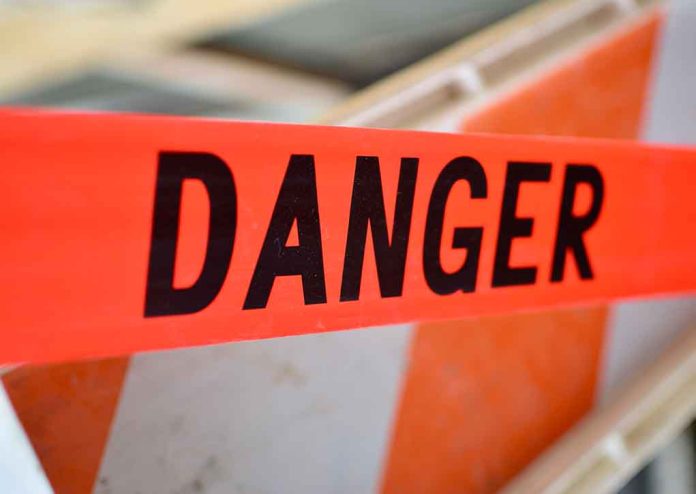
A North Carolina teenager’s celebratory fishing trip turned into a life-threatening ordeal when a deadly timber rattlesnake struck without warning in the remote wilderness of Pisgah National Forest.
Key Takeaways
- 17-year-old Zain Shah was bitten by a timber rattlesnake during a fishing trip in Pisgah National Forest, two miles from the nearest accessible road
- With no cell service on his phone, Zain used his friend’s device to call 911, demonstrating the critical importance of the buddy system in wilderness activities
- A National Guard Black Hawk helicopter airlifted Zain to safety after a two-hour wait for rescuers to reach his remote location
- Medical staff administered 12 vials of antivenom over three days to counteract the potentially deadly venom
- Despite the harrowing experience, Shah, who will graduate high school on June 14, plans to return to outdoor activities but vows never to venture alone again
A Peaceful Fishing Trip Turns Deadly
What began as a celebration of the end of high school quickly descended into a fight for survival when 17-year-old Zain Shah encountered one of North America’s most dangerous reptiles. The incident occurred on June 5 near Lost Cove Creek in Pisgah National Forest, where Shah and a friend had ventured approximately two miles from the nearest road. The remote location, combined with limited cell service, created a perfect storm of danger when the unexpected happened – a rattlesnake strike that left the teenager facing potentially fatal consequences without immediate medical intervention.
“What started as a fun end-of-high-school fishing trip for my son and his buddy in the western North Carolina mountains turned deadly when he was bitten by a timber rattlesnake deep in the woods,” said Imran Shah, Zain’s father.
The Moment of Impact
The attack happened with the sudden, silent efficiency that makes venomous snakes so dangerous. Shah had no warning before the timber rattlesnake – a species that can grow up to seven feet long and possesses potent hemotoxic venom – struck his foot. The initial bite seemed inconsequential, but the visible evidence and immediate physical symptoms confirmed the teenager’s worst fears. With remarkable presence of mind, Shah immediately recognized the gravity of his situation and took action to save his own life while isolated in the wilderness.
“At the point where we were about to turn back, I stepped over a log and as my foot landed, I felt a prick. It was painless. I looked down and see a rattlesnake sitting there. I think: ‘No way that just happened.’ But I rolled down my sock and see two red dots and blood coming out. I knew it was potentially deadly,” said Zain Shah.
A Race Against Time
With his own phone lacking service, Shah used his friend’s device to make a critical 911 call. This single decision highlights the life-saving importance of the buddy system in wilderness adventures – a lesson Shah has now permanently incorporated into his life philosophy. Multiple emergency response agencies coordinated a complex rescue operation, including North Carolina Emergency Management, NCHART, and the Charlotte Fire Department. The remote location necessitated deployment of a National Guard Black Hawk helicopter to extract the injured teenager before the venom could cause irreversible damage.
“with the rescue of a hiker that had sustained a snake bite,” said North Carolina Emergency Management (NCEM).
Intensive Medical Treatment Saves Young Life
After a tense two-hour wait in the wilderness, rescuers reached Shah and facilitated his airlift to Johnson City Medical Center in Tennessee. Medical professionals initially suspected a “dry bite” – where a snake strikes without injecting venom – but bloodwork revealed a more serious situation with risk of uncontrolled bleeding. Doctors administered 12 vials of antivenom over three days to neutralize the potent toxins. This aggressive treatment protocol undoubtedly saved Shah’s life and preserved his future, including his upcoming high school graduation scheduled for June 14.
“All of them saved my life. I wouldn’t be here without the help of so many people. I have ventured alone into the mountains before, but I’ll never do that again. The buddy system only from now on, but this will not keep me from going back out there,” said Zain Shah.
A Survivor’s Perspective
Now recovering at home, Shah has expressed profound gratitude toward the multi-agency response that saved his life. His experience serves as a powerful reminder of both nature’s dangers and the exceptional emergency response capabilities available to American citizens in crisis. While the encounter with a deadly predator could have ended tragically, it instead transformed into a story of survival that underscores the importance of preparation, quick thinking, and maintaining contact with others when exploring America’s vast wilderness areas.
“All of them saved my life,” said Zain Shah.



